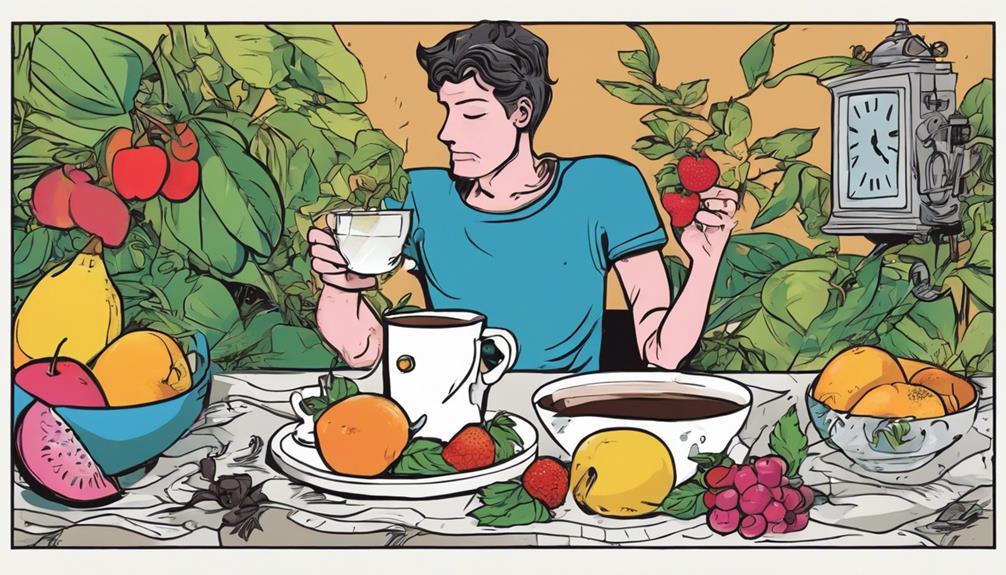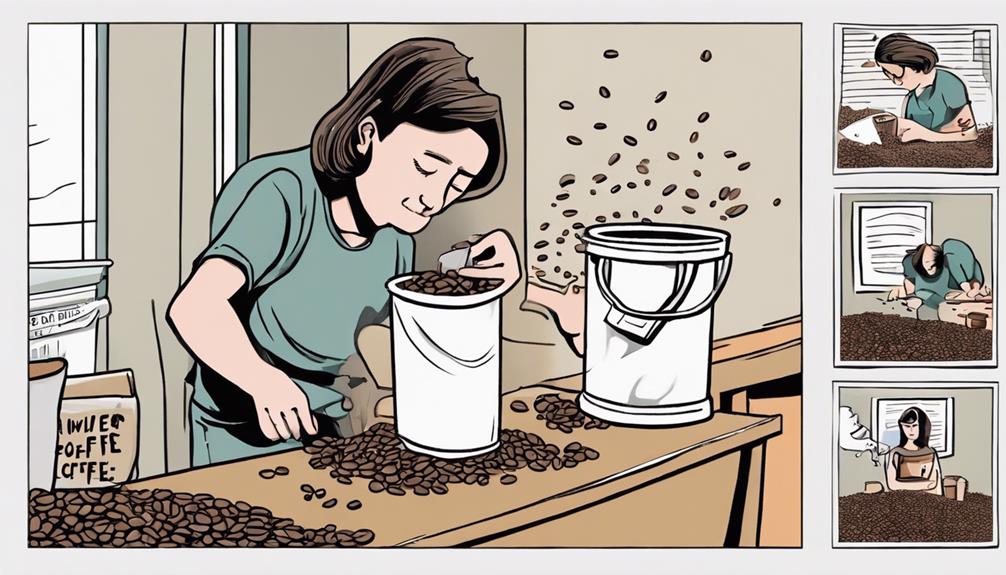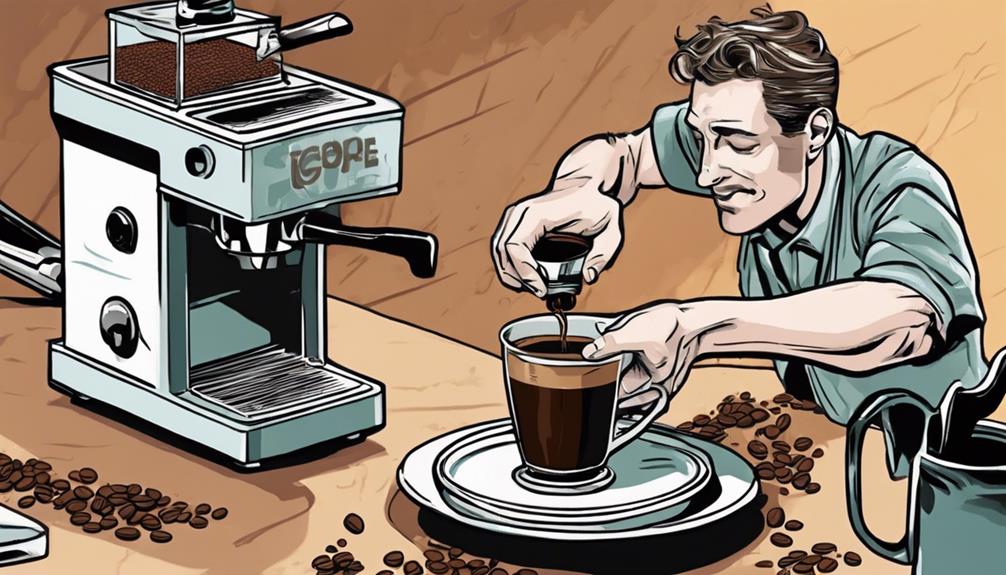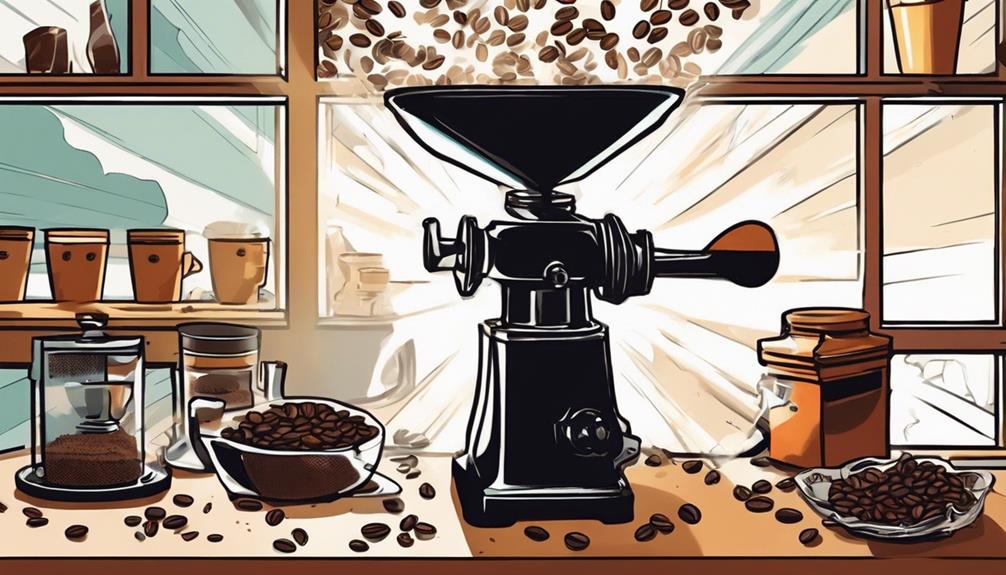Escape from your coffee addiction with ease! Begin by slowly reducing your caffeine intake over a period of one to two weeks. Consider switching to herbal teas such as chamomile or peppermint for a soothing alternative. Make sure to stay well-hydrated to prevent dehydration symptoms like headaches and fatigue. Get enough rest to help your body adjust during this transition. Explore caffeine-free options to increase your energy levels. By implementing these positive changes, you can effectively switch to a caffeine-free lifestyle. Remember, each step you take towards breaking the coffee habit improves your overall health and well-being.
Key Takeaways
- Gradually reduce coffee intake over 1-2 weeks.
- Replace coffee with herbal teas for comfort.
- Ensure proper hydration to combat withdrawal symptoms.
- Prioritize rest for stress management during transition.
- Seek support, stay motivated, and maintain a positive mindset.
Effects of Caffeine Consumption
Consuming caffeine, especially in excessive amounts, can have harmful effects on your health. When it comes to caffeine consumption, it's vital to be aware of the negative impacts it can have on your neurological and cardiac health. Exceeding 300mg of caffeine daily may lead to adverse effects, posing risks to your overall well-being.
While the FDA recommends up to 400mg of caffeine per day for healthy adults, the AMA suggests limiting intake to 250mg to mitigate potential health issues. Pregnant women, in particular, should be cautious and restrict their caffeine intake to 200mg daily to reduce possible risks to both their health and the health of their unborn child.
It's important to take these guidelines into account and be mindful of the amount of caffeine you consume, especially if you fall into vulnerable categories like pregnant women, as it can significantly impact your health and well-being.
Caffeine Dependence and Withdrawal

When facing caffeine dependence and withdrawal, effectively addressing symptoms is crucial for a successful shift to a caffeine-free lifestyle. Caffeine withdrawal symptoms like tremors, edginess, migraines, tiredness, and trouble focusing can be difficult to overcome.
Suddenly stopping caffeine, also known as quitting abruptly, can intensify dependence and result in more severe withdrawal symptoms. To lessen these effects, it's advisable to gradually decrease caffeine consumption over one to two weeks. This gradual method can help your body adapt more smoothly to the decreased caffeine levels.
Furthermore, be aware of concealed sources of caffeine, like analgesics, which can sustain dependency and impede efforts to quit caffeine. Seeking advice from healthcare providers for substitutes to caffeine-containing medications can help in effectively managing withdrawal symptoms.
Additionally, integrating stress relief techniques into your routine can also assist in handling the challenges of caffeine dependence and withdrawal. Remember, taking proactive measures to reduce caffeine intake and address withdrawal symptoms can make the shift to a caffeine-free lifestyle more feasible.
Strategies for Quitting Caffeine

To successfully quit caffeine, consider implementing strategic methods to gradually reduce your intake and manage potential withdrawal symptoms effectively. Start by tapering off your caffeine consumption over one to two weeks before quitting altogether. This gradual approach can help minimize the intensity of withdrawal symptoms such as headaches and fatigue.
Additionally, finding suitable alternatives like herbal teas, warm milk with honey, or other comforting beverages can ease the shift away from caffeine.
During the quitting process, prioritize hydration, rest, and relaxation techniques to support your body and mind. Staying hydrated can alleviate some withdrawal symptoms, while getting enough rest and practicing relaxation techniques like deep breathing or meditation can help manage stress and improve sleep quality.
It's crucial to remind yourself of the benefits of quitting caffeine, stay motivated, and seek support from friends and family to navigate this challenging but rewarding journey. Set a quit date, mentally prepare, and approach the process with a positive mindset to break the coffee habit successfully.
Caffeine Alternatives and Swaps

Looking for alternatives to your daily coffee fix?
Herbal teas like chamomile or peppermint provide a calming experience, while matcha or green tea offer a gentle caffeine kick without the coffee jitters.
Swap your usual brew for sugar-free seltzer or colorful, unsweetened teas for a caffeine-free option during social gatherings.
Alternative Beverage Options
Consider incorporating herbal teas and unsweetened seltzer water as caffeine substitutes and invigorating switches in your journey to break the coffee habit without stress.
Herbal teas such as chamomile and peppermint offer soothing caffeine-free options, while unsweetened seltzer water can provide a revitalizing alternative to carbonated drinks.
Opting for colorful and caffeine-free teas can add variety to your beverage choices, perfect for social outings or moments of relaxation.
Additionally, exploring decaf options allows for a gradual reduction in caffeine intake, aiding in the shift to a coffee-free lifestyle.
By identifying your consumption habits, you can tailor these alternative beverages to seamlessly integrate into your daily routine, making the change away from coffee more manageable and enjoyable.
Embrace these alternatives to not only reduce your caffeine intake but also discover new flavorful and invigorating drinks to savor throughout your day.
Healthy Coffee Substitutes
Explore healthier coffee substitutes with caffeine alternatives and swaps that can seamlessly fit into your daily routine. Herbal teas such as chamomile and peppermint offer a soothing caffeine-free option, perfect for a relaxing afternoon break. For a milder caffeine boost, try matcha or green tea as a gentler alternative to your morning cup of coffee. Opt for colorful caffeine-free teas for social gatherings or when winding down in the evening. If you crave something fizzy, sugar-free seltzer water can provide a bubbly and caffeine-free alternative to soda. By identifying your consumption habits, you can make informed choices to transition to a healthier lifestyle without sacrificing enjoyment. Experiment with these coffee substitutes to find what suits your taste buds and supports your well-being.
| Healthy Coffee Substitutes | Benefits |
|---|---|
| Herbal Teas | Soothing and calming |
| Matcha/Green Tea | Gentle caffeine boost |
| Caffeine-Free Teas | Variety for relaxation |
| Seltzer Water | Bubbly, caffeine-free |
Benefits of Quitting Coffee

Quitting coffee can lead to a myriad of benefits, including improved sleep quality, reduced anxiety, and better hydration. When you decide to break the habit, you set yourself up for a range of positive impacts on your health and well-being.
Here are some of the benefits you can experience:
- Improved Sleep Quality: Without the stimulant effects of caffeine disrupting your sleep patterns, you're likely to enjoy deeper and more restful sleep.
- Increased Energy Levels: Contrary to popular belief, quitting coffee can actually lead to more stable energy levels throughout the day.
- Enhanced Overall Well-being: By reducing your caffeine intake, you may notice improvements in your mood, experience less anxiety, and feel generally healthier.
Steps to Successfully Quit Coffee

Gradually decrease your coffee intake by swapping out one cup a day for decaf or herbal tea to ease the adjustment smoothly. This gradual decrease can help your body adapt to lower caffeine levels without experiencing intense withdrawal symptoms.
Look for alternative sources of caffeine like herbal teas such as chamomile or green tea to provide a gentle energy boost during this pivotal period. It's vital to stay hydrated by drinking 8-10 glasses of water daily to flush out toxins and support your body through the quitting process.
Additionally, establish a consistent sleep schedule and create a relaxing bedtime routine to aid your body during this change.
If you find that withdrawal symptoms are severe or unmanageable, seek professional guidance to receive tailored support for a successful shift. Remember, success in quitting coffee is possible with the right strategies and support in place.
Managing Withdrawal Symptoms

To effectively manage withdrawal symptoms when quitting coffee, maintaining proper hydration is essential to flush out toxins and combat dehydration. Dehydration can worsen symptoms like headaches and fatigue, so make sure to drink plenty of water throughout the day.
Additionally, consider incorporating herbal teas such as chamomile or peppermint to help alleviate discomfort and promote relaxation during this adjustment period.
- Maintain Proper Hydration: Drink water regularly to flush out toxins and combat dehydration.
- Try Herbal Teas: Chamomile or peppermint teas can help alleviate headaches and promote relaxation.
- Get Adequate Rest: Make sure you're getting enough rest and relaxation to support your body through this process.
Maintaining a Coffee-Free Lifestyle

You can start by exploring caffeine-free beverage options that can still provide you with an invigorating boost.
Discover the wellness benefits you might experience after ditching coffee and embracing a new lifestyle. When you say goodbye to coffee, you open yourself up to a world of new wellness benefits. You may find that you have more stable energy levels throughout the day, without the crash that often comes with coffee consumption. Additionally, breaking down coffee beans releases oils that can contribute to stomach irritation and acid reflux. By eliminating coffee from your routine, you may notice a reduction in these uncomfortable symptoms. Overall, embracing a new lifestyle without coffee can lead to enhanced wellbeing and improved digestive health.
Remember the importance of having a supportive network to encourage and motivate you along your journey to a coffee-free life.
Caffeine-Free Beverage Options
Consider exploring various caffeine-free beverage options to help maintain a coffee-free lifestyle. When looking for alternatives, herbal teas such as chamomile or peppermint can provide a soothing and flavorful choice without the caffeine.
Additionally, swapping coffee for matcha or green tea offers a gentle boost of energy without the jitters commonly associated with coffee consumption. It's crucial to be mindful of hidden caffeine sources in foods and drinks to successfully adhere to a coffee-free lifestyle.
Remember to stay hydrated throughout the day by drinking water and incorporating hydrating fruits into your diet to support your caffeine-free journey. Alongside choosing caffeine-free beverages, prioritize self-care practices and stress management techniques to stay energized and focused without relying on coffee for a pick-me-up.
Wellness Benefits Post-Coffee
Regularly prioritizing wellness benefits post-coffee is vital for successfully maintaining a coffee-free lifestyle. Once you quit drinking coffee, you'll start experiencing the benefits of reducing your caffeine intake.
Healthy adults often report improved energy levels throughout the day and better sleep quality after giving up coffee. Managing stress becomes more manageable as caffeine levels in your system decrease, leading to reduced anxiety and enhanced stress management.
Make sure to explore Coffee Alternatives that can provide you with a natural energy boost without the side effects of caffeine. By focusing on the benefits of quitting coffee, such as improved hydration and overall well-being, you can stay motivated to continue on your coffee-free journey.
Support System Importance
Maintaining a coffee-free lifestyle becomes more manageable when you establish a strong support system around you. Having a support system can greatly impact your journey to quit coffee and help you navigate various challenges along the way.
Here's how your support system can boost your efforts:
- Joining online support groups or connecting with like-minded individuals locally can provide you with a community that understands your dedication to a coffee-free lifestyle.
- Accountability partners play an essential role in helping you stay on track and motivated. They can offer encouragement during tough moments and celebrate your victories with you.
- Sharing your progress and setbacks with your support system not only boosts your motivation but also keeps you focused on your goal. This shared experience can empower you to tackle social situations where coffee is common and stay committed to your decision to lead a coffee-free life.
Long-Term Caffeine-Free Lifestyle

Successfully maintaining a long-term caffeine-free lifestyle requires commitment and strategic planning. To help you stay on track, consider the following tips:
| Tips for Long-Term Caffeine-Free Lifestyle | ||
|---|---|---|
| Find alternative energy boosts | Build a support system | Be mindful of hidden caffeine sources |
| Prioritize self-care practices | Manage stress effectively | Explore healthy ways to boost energy |
Frequently Asked Questions
How Can I Stop My Addiction to Coffee?
You can stop your addiction to coffee by gradually reducing intake, replacing it with herbal teas or decaf, staying hydrated, informing others for support, and focusing on the benefits like improved sleep, reduced anxiety, and stable energy levels.
How Long Does It Take to Break a Caffeine Addiction?
Breaking a caffeine addiction can take about 7-12 days, with symptoms peaking around day 2-3. Gradually reducing intake can help minimize withdrawal symptoms. Remember, it's a process, but you can do it!
What Are Coffee Withdrawal Symptoms?
Feeling the effects of caffeine withdrawal? Headaches, fatigue, irritability, and trouble focusing may hit within 12-24 hours after quitting. Symptoms vary but can linger for about a week. Stay hydrated, rest, and try relaxation techniques for relief.
Is It Safe to Quit Caffeine Cold Turkey?
Quitting caffeine cold turkey isn't recommended due to potential severe withdrawal symptoms. It's safer to gradually decrease caffeine intake over 1-2 weeks to minimize withdrawal effects. Seek professional guidance for effective symptom management.
Conclusion
To sum up, breaking your coffee habit is possible with the right strategies and mindset. Just like Sarah, a busy mom who successfully quit coffee by gradually replacing it with herbal tea and enjoying a morning walk for an energy boost.
By taking small steps and staying determined, you too can kick the caffeine habit and reap the benefits of a healthier lifestyle.
So go ahead, take that first step towards a coffee-free life today!









